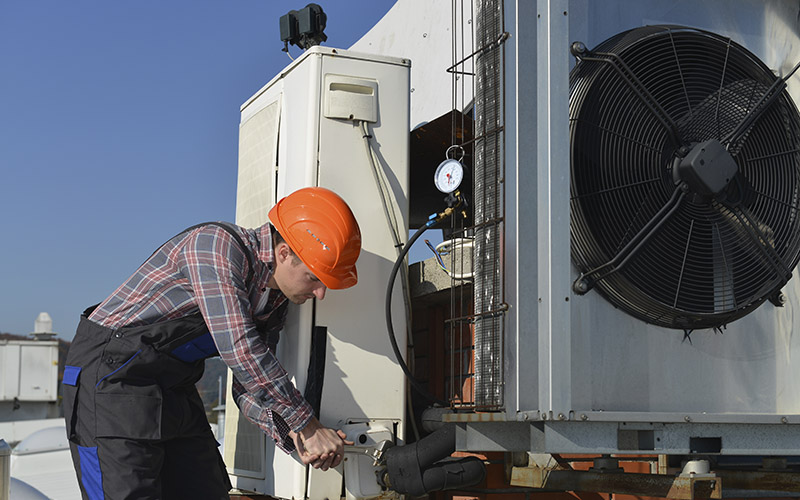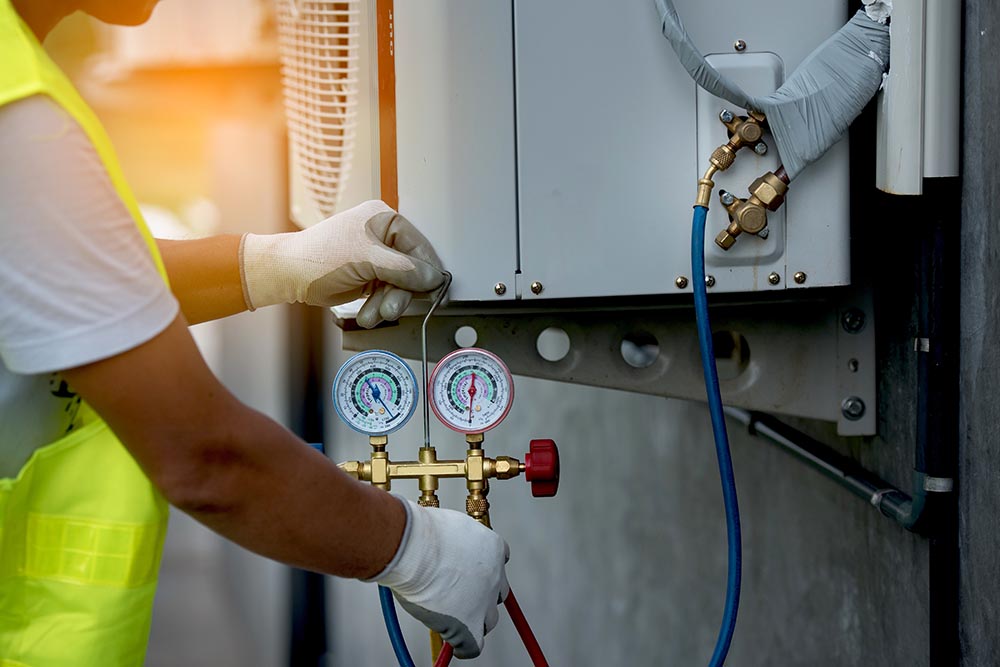Breaking Down the ROI on furnace replacement
Wiki Article
Choosing Between a Heatpump and Heating System: Secret Considerations for Your Cooling And Heating Needs
When evaluating home heating choices for a/c needs, the choice between a heatpump and a furnace can be complex. Each system supplies distinctive benefits customized to particular climates and energy performance objectives. Comprehending these differences is essential for making an enlightened choice. Key variables such as installment expenses and ecological effect further complicate the selection process. Which option absolutely aligns with one's convenience and sustainability choices? The complying with areas will certainly explore these considerations thoroughly.Understanding Warm Pumps: How They Function and Their Benefits
While several house owners consider various home heating options, recognizing exactly how heatpump function and their advantages can considerably influence their decision. Heatpump run by transferring warm rather than generating it. In the wintertime, they remove warmth from the outside air or ground and move it indoors, while in the summertime, they reverse this procedure, cooling down the home by expelling warmth outside. This dual performance makes them versatile for year-round climate control.One of the primary advantages of heatpump is their energy efficiency. They make use of substantially much less electricity contrasted to traditional furnace, potentially resulting in lower utility expenses (heat pump service). Furthermore, warm pumps have a smaller sized carbon impact, making them an ecologically friendly selection. They likewise require less upkeep than traditional systems, adding to long-term expense financial savings. On the whole, understanding the technicians and benefits of heatpump can aid homeowners make notified decisions concerning their heating and cooling down needsExploring Heating Systems: Kinds, Operation, and Advantages
Furnaces can be found in various types, including gas, electrical, and oil designs, each with distinctive functional devices. Comprehending these differences is vital, as they influence effectiveness and home heating performance. In addition, furnaces offer many advantages, such as regular warmth outcome and dependability in chillier climates.Sorts of Furnaces
Heater can vary significantly in design and procedure, with furnaces being a prominent option amongst property owners. There are a number of sorts of furnaces, each using various gas resources and modern technologies. Gas furnaces prevail, leveraging all-natural gas to produce warmth efficiently. Electric heating systems, on the other hand, use electrical resistance to generate heat, often preferred for their simple installment. Oil heaters, while much less typical, are reliable in locations with limited gas accessibility (heat pump replacement ooltewah tn). In addition, condensing heaters make best use of energy performance by capturing and recycling exhaust gases. Each kind runs with a system of warm exchangers and ductwork to disperse warm air throughout a home. Comprehending the differences between these heater types is essential for informed a/c choicesAdvantages of Heating systems
For home owners seeking reliable warmth throughout cool months, the advantages of heaters are significant. Heaters supply consistent heating, making sure also temperatures throughout the home. They are especially reliable in extreme chilly, usually exceeding warm pumps in cold conditions. Various kinds, consisting of gas, electric, and oil furnaces, supply flexibility to meet diverse needs and preferences.Furnaces also tend to have lower first setup costs contrasted to warm pumps, making them a much more easily accessible alternative for several. Their durable design contributes to a much longer lifespan, with numerous units lasting over 15 years with appropriate upkeep. Additionally, modern furnaces are typically furnished with sophisticated innovation for improved effectiveness, which can result in lowered energy costs. Generally, heating systems stay a reputable selection for efficient home heating.
Power Performance: Contrasting Warmth Pumps and Furnaces
When comparing energy performance in between heat pumps and heating systems, the Seasonal Power Efficiency Proportion (SEER) plays an important function in figuring out performance. Additionally, an operational price analysis exposes the long-lasting economic implications of each system. Comprehending these variables can direct property owners in making notified choices concerning their home heating solutions.Seasonal Power Effectiveness Ratio
Power effectiveness plays an essential function in the decision-making process between warm pumps and furnaces, particularly when considering the Seasonal Power Effectiveness Proportion (SEER) This metric steps the cooling performance of warmth pumps over an entire air conditioning period, supplying a standard method to examine efficiency. Higher SEER rankings indicate greater power performance, equating to lower power intake and minimized energy expenses. In contrast, furnaces are normally assessed using the Annual Gas Usage Efficiency (AFUE) score, which mirrors heating performance. When contrasting these two systems, home owners ought to focus on SEER scores for warm pumps, as they directly impact total energy savings and ecological sustainability. A thorough understanding of SEER can notably affect the lasting satisfaction and cost-effectiveness of the selected HVAC option.Functional Cost Evaluation
Recognizing the functional expenses associated with heatpump and furnaces is important for house owners evaluating their options. Heatpump usually offer greater energy effectiveness, converting electric energy into heat with minimal waste. This results in reduced monthly energy expenses, particularly in moderate climates. Conversely, traditional furnaces, particularly gas versions, may have lower in advance expenses however can incur higher functional costs in time as a result of sustain rates and performance ratings.Moreover, heat pumps can operate as both heating and cooling down systems, potentially decreasing the requirement for separate HVAC systems. While first investments for heat pumps may be greater, their long-lasting savings in power efficiency can make them an extra economical selection for numerous houses. Mindful analysis of neighborhood power prices is important to identify the very best choice.Installment Prices: What to Expect for each and every Heating Unit
Installment costs for heating unit can vary considerably in between warm pumps and heaters, affecting house owners' decisions. Heatpump generally have higher upfront installation expenses, normally varying from $3,500 to $8,000, depending on the unit size and intricacy of installation. This consists of the outside unit, indoor handling system, and necessary ductwork alterations. Conversely, heaters often tend to have lower first costs, balancing in between $2,500 and $6,000, which can be appealing for budget-conscious homeowners. However, setup expenditures can enhance if considerable ductwork is required.Moreover, the selection of gas kind for furnaces-- all-natural gas, propane, or electric-- can likewise impact setup costs. While heatpump offer power performance, their preliminary financial investment may prevent some buyers. Inevitably, evaluating installment prices together with long-term savings and efficiency will certainly help home owners in making notified decisions regarding their heater.Climate Factors To Consider: Which System Does Much Better in Your Area
Exactly how do climate conditions affect the effectiveness of heater? The efficiency of heatpump and furnaces can differ greatly relying on the neighborhood environment. In moderate environments, heatpump excel by effectively transferring heat from the outdoors air, making them an energy-saving alternative. Their effectiveness diminishes in very cool temperature levels, where they may struggle to remove sufficient heat. On the other hand, heating systems, specifically gas models, supply consistent and trustworthy warm despite exterior conditions, making them preferable in chillier regions.In locations that experience milder winters, heatpump can operate properly year-round, supplying both heating & cooling. In contrast, regions with extreme winters months usually gain from the effectiveness of furnaces. Ultimately, recognizing the neighborhood environment is important when deciding between a heat pump and a heater, as it straight affects their operational performance and overall performance.Upkeep Needs: Long-Term Look After Warm Pumps vs. Furnaces
While both heat pumps and furnaces need normal maintenance to ensure peak efficiency, their details requirements and treatment routines vary significantly. Furnaces normally need much less frequent interest, with annual assessments sufficing to examine for gas leakages, tidy filters, and analyze general functionality. Their easier style commonly permits uncomplicated repairs.In contrast, heat pumps necessitate semiannual upkeep due to their twin role in heating & cooling. This consists of cleansing coils, checking cooling agent levels, and making certain that both the indoor and outdoor systems work at their best. Furthermore, heatpump upkeep typically involves more complex elements, making specialist maintenance essential.Neglecting upkeep can cause decreased performance and enhanced energy expenses for both systems. Eventually, home owners ought to consider these long-lasting care requirements when choosing between a warmth pump and a heater, as proactive maintenance can expand the life-span and performance of either system significantly.Ecological Effect: Choosing a Lasting Home Heating Alternative
The environmental influence of heater is a crucial assessment for property owners seeking lasting options. Heatpump are normally more energy-efficient than conventional furnaces, as they move heat instead of create it, substantially minimizing carbon emissions. By using renewable resource sources, such as air-source or geothermal warm pumps, home owners can further reduce their environmental footprint.On the other hand, gas heating systems release greenhouse gases and add to air pollution, though they commonly provide higher warmth outcome. Improvements in technology have actually led to the development of high-efficiency heating systems that reduce emissions.Ultimately, choosing a heating system entails evaluating effectiveness against ecological impact. House owners are motivated to assess neighborhood power sources and incentives for renewable systems, guaranteeing an see this site option that aligns with both individual comfort and ecological responsibility. The decision influences not only instant comfort yet additionally long-term sustainability and ecological health.Regularly Asked Concerns
How Much Time Do Warmth Pumps and Furnaces Generally Last?
The life expectancy of heat pumps typically varies from 15 to 20 years, while heating systems can last in between 15 to thirty years. Normal maintenance significantly impacts their longevity and effectiveness in giving home heating remedies.Can I Use a Warm Pump in Exceptionally Cold Climates?
Heatpump can run in exceptionally chilly environments, however their efficiency reduces as temperatures decrease. In such problems, supplementary heating resources might be needed to preserve comfy indoor temperatures and ensure peak performance.
What Is the Noise Degree of Warm Pumps Versus Furnaces?
The noise degrees of heatpump and furnaces vary significantly. Typically, heat pumps operate even more silently than standard heating systems, making them better for those delicate to sound, while furnaces might create louder operational noises throughout home heating cycles.
Are Heat Pumps Suitable for Both Cooling And Heating?
Heatpump are webpage certainly suitable for both heating & cooling (heat pump installation ooltewah tn). They operate by transferring warmth, offering efficient temperature level control year-round, making them a versatile selection for homeowners seeking an all-in-one HVAC optionWhat Dimension Home Heating System Do I Need for My Home?
Identifying the suitable dimension heating unit for a home needs assessing factors such as square footage, insulation quality, local climate, and the home's design. Consulting an expert can ensure an exact analysis and optimal comfort. Warm pumps commonly offer greater power effectiveness, transforming electric power right into warmth with minimal waste. In moderate environments, heat pumps succeed by successfully transferring warm from the outside air, making them an energy-saving choice. Alternatively, furnaces, especially gas designs, offer dependable and constant heat no matter of outdoor conditions, making them more suitable in cooler pop over to these guys regions.In areas that experience milder winter seasons, warm pumps can operate effectively year-round, providing both home heating and air conditioning. Warmth pumps are generally a lot more energy-efficient than standard heating systems, as they transfer heat rather than create it, significantly reducing carbon discharges. By using sustainable energy resources, such as air-source or geothermal heat pumps, property owners can better minimize their ecological footprint.On the various other hand, all-natural gas heaters discharge greenhouse gases and add to air pollution, though they commonly provide greater warm output.Report this wiki page